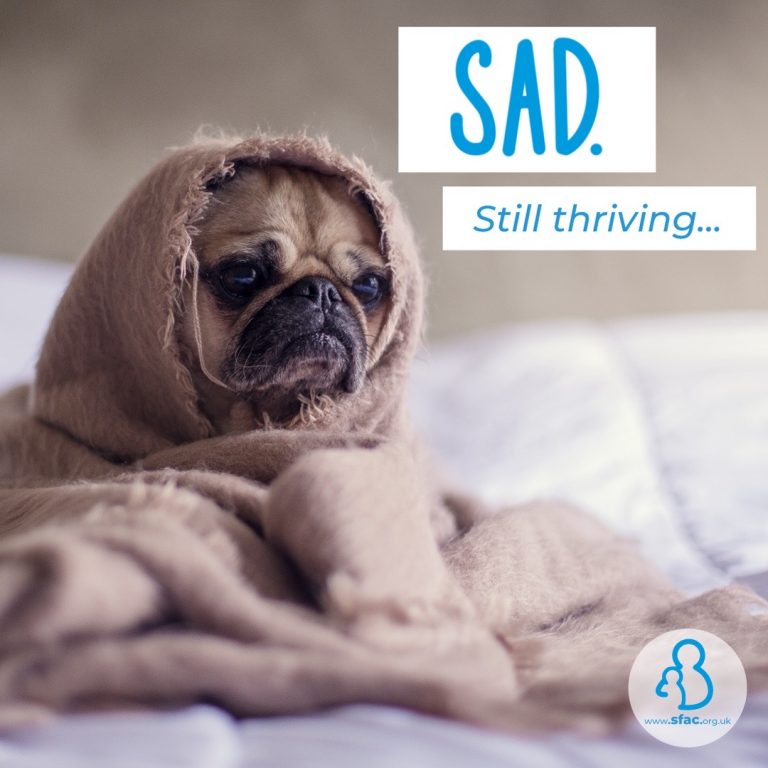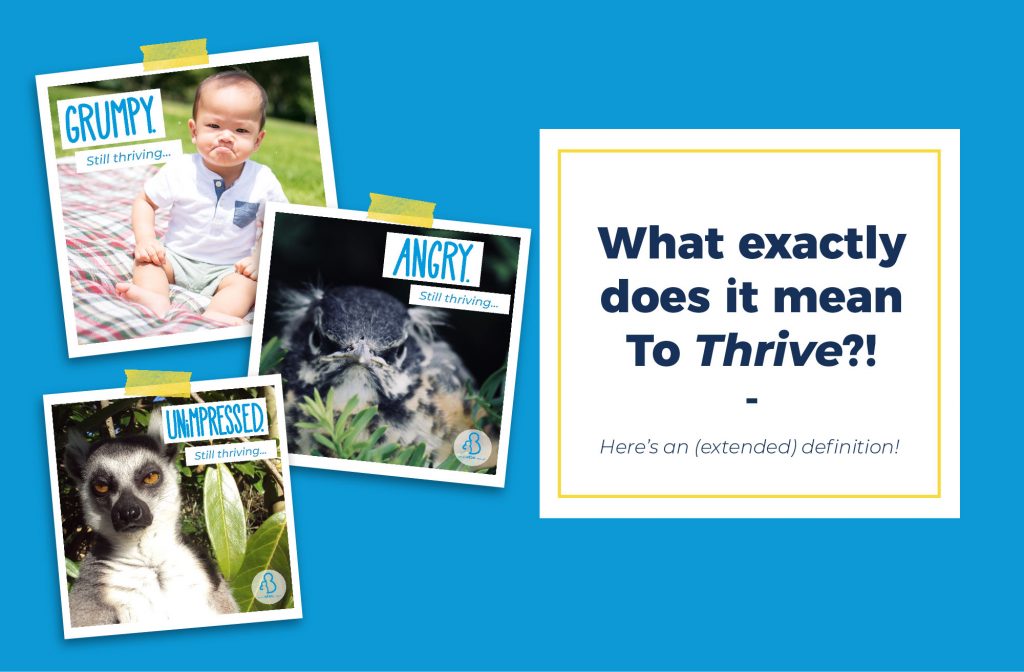Over the last twelve months we’ve developed a little equation to help sum up our vision and our work:
Safe + Belong = Thrive
“A place to be and feel safe plus somewhere to belong equals the best chance to thrive”.
Welcome to the first post in a new series for 2020. Each month we’ll be exploring an underlying aspect of our work, a bit about why we think it matters and what it might mean for you in your life or work. To kick things off we’re taking a deep dive into “thrive” (rhyming intentional!) Then, in a few weeks time we’ll be back here to explore what we mean by safe in more depth and the month after that we’ll be looking at the belong part of the equation.
So, back to thrive…
Turns out it’s not an easy thing to pin down!
The Collins English Dictionary defines it as:
“1. (Verb) If someone thrives they do well and are successful, healthy or strong.
2. (Verb) If you say someone thrives on a particular situation, you mean that they enjoy it or that they can deal with it very well, especially when other people find it unpleasant or difficult.”
A great start… but what does that look like in practice?
Child Rights as a Foundation for Thriving
Let’s begin by considering the UNCRC (The United Nations Convention on the Rights of the Child - a bit of a mouthful?!). This important convention underpins all of our work here at SFAC. In fact, technically it should be underpinning all care and protection of children in every country around the world, (except for the USA) because we are all signed up to it.
This carefully thought out list details what every child needs to live a good life. In the preamble to the Universal Declaration of Human Rights, rights are described as the “foundation of freedom, justice and peace in the world” - the essential foundation for individuals and communities to thrive. If you have a look through the UNCRC (you can find it here - I recommend the summary version!) you’ll see most of the rights could fit under the categories of either safety or belonging. Here’s a few examples to get you started that I’ve taken from this child friendly poster version (this poster used to hang in my therapy room when I was a school psychologist in Australia).
Some rights associated with Safety
Article 6: You have the right to be alive.
Article 11: You have the right to be protected from kidnapping.
Article 24: You have the right to the best health care possible, safe water to drink, nutritious food, a clean and safe environment, and information to help you stay well.
Some rights associated with Belonging
Article 7: You have the right to a name.
Article 9: You have the right to live with your parent(s) unless it is bad for you. You have the right to live with a family who cares for you.
Article 15: You have the right to choose your own friends and join or set up groups as long as it isn’t harmful to others.
All of these things, these rights contribute to our freedom to express ourselves, be who we are and to be connected with the rest of humanity.
Quick Disclaimer:
You will see people thriving despite rights violations and without that sense of safety or belonging. It’s important to recognise that they’ve had to work extra hard to achieve what they have. Research has shown that having just one safe adult in a child’s life can improve their future outcomes even when the rest of life is chaos. Obviously, the aim is for everyone to be starting from the same foundation of security and belonging.
Why it’s important to understand what we mean by thrive
At SFAC we often describe our work as “turning good intentions into good practice.” We recognise that most people working with and making decisions on behalf of children do so because they want those kids to thrive! This includes people who donate money to children’s charities like us… Here’s why we think it’s worth going deeper in our understanding of what it is to thrive: if we don’t really understand what it means to thrive or how children can thrive then we might start making some costly mistakes. Costly in terms of finance but, more importantly, costly in terms of children’s lives and wellbeing.
In our 20 year, 40 country (so far!) experience, we’ve realised that people often focus on one aspect of thriving, i.e physical needs; so food, shelter, medical care, and they overlook or minimise the rest. Turns out “the rest;” the feeling safe and having a sense of belonging, is often the most important bit!
How thriving and risk-taking go hand in hand (and why risk-taking can be a good thing!)
When we know we have a safe place, a place where we feel like we belong, we can be brave. We can take risks. We can try new things. It is this courage that allows us to continue growing and developing throughout our lives. It is this foundation that gives us the courage to embrace life and to thrive.
An example from my own life might help explain what I mean. It’s January as I write this - the start of a new year, a new decade. Thinking back over the previous decade , I quickly realised it had a bit of a theme - risk taking!
Here’s a quick summary:
- I packed up my stuff, selling or giving away a lot of it, and moved to India to live and work with people I’d never met.
- A year later I met Dan at an SFAC training event which led to 8 months of online conversation. This led to a decision to fly home to Australia via Uganda (not a natural stopover when flying between Kolkata and Sydney!) - a country and continent I’d never been to before - to
watch another SFAC trip from the sidelines and to spend some time with Dan just in case he might turn out to be “someone special”. - It turned out he was kind of alright which meant yet another big risk - a trip to the UK to see his home and meet his mum and best mate.
- After temporary relocation to Kenya (where I shared a house with some lovely people and a less lovely horde of cockroaches) and a couple of run-ins with malaria, Dan and I decided we wanted to get married. That’s right, married. After a grand total of only 32 days spent in the same country at the same time (but around 50,000 messages. Yup, it really was that many!!).
- So yet another big risk… Once again packing up my stuff and relocating to a whole new country.
That’s quite a decade!
Every single one of these risks relied on a foundation of safety and belonging. I only felt able to take each scary step into the unknown because I was 100% secure in the knowledge that, should it all go wrong, I had a community of family and friends to return to - people that would give me a bed, feed me, be a shoulder to cry on; people who would take care of my physical and emotional needs, while I got back on my feet.
If the risks didn’t pay off, if it all fell apart, I wouldn’t hit the ground. I’d land in the arms of my safety net.
As it turned out each of these risks was absolutely worth it, but definitely not without challenges (and blood, sweat and tears) along the way. I called on that safety net often. Meals and beds were provided, shoulders cried on, frustrations vented. And I didn’t just survive. I thrived. I am the person I am now because of those risks. I took those risks because I felt safe enough to do so. Why did I feel safe? Because I knew I had somewhere I belonged - people who loved me and cared about my welfare.
This is thriving… being secure enough in our safety net to step into the unknown of the future, to risk trying something new, to live a full life, because we know, if we fall, someone will catch us.
This is why you’ll often hear us talking about families at SFAC - because we know that for most children, growing up in a safe family is the place they’re most likely to be and feel safe, to feel like they belong, and so have the best chance to thrive.

What don’t we mean by thrive?
I just want to take a moment here to say thriving doesn’t mean living a perfect, Instagram worthy life. And it definitely doesn’t mean being happy all the time! I would even go so far as to say that thriving involves experiencing the full range of human emotions and having the capacity to express and manage them in a healthy way. Learning to cope with adversity is part of thriving. This is illustrated in the millions of people around the world living with chronic illness, in poverty, or facing racism etc. and yet continuing to connect with others and live lives they find meaningful.
So, it all boils down to this one thing.
We want children everywhere to thrive.
We’ve got big plans this year, to provide you with tips designed to help you and those you love thrive.
What information would help you to give the children in your world a chance to thrive? How can we help you to thrive?
We’d love to hear from you in the comments or on info {at} sfac {dot} org {dot} uk.

